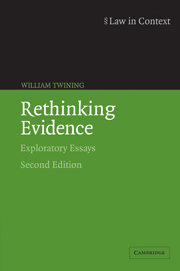Book contents
- Frontmatter
- Contents
- Preface
- Acknowledgements
- List of abbreviations
- Table of cases
- 1 Introduction: the story of a project
- 2 Taking facts seriously
- 3 The Rationalist Tradition of evidence scholarship
- 4 Some scepticism about some scepticisms
- 5 Identification and misidentification in legal processes: redefining the problem
- 6 What is the law of evidence?
- 7 Rethinking Evidence
- 8 Legal reasoning and argumentation
- 9 Stories and argument
- 10 Lawyers' stories
- 11 Narrative and generalizations in argumentation about questions of fact
- 12 Reconstructing the truth about Edith Thompson the Shakespearean and the jurist
- 13 The Ratio Decidendi of the Parable of the Prodigal Son
- 14 Taking facts seriously – again
- 15 Evidence as a multi-disciplinary subject
- Bibliography
- Index
13 - The Ratio Decidendi of the Parable of the Prodigal Son
Published online by Cambridge University Press: 15 December 2009
- Frontmatter
- Contents
- Preface
- Acknowledgements
- List of abbreviations
- Table of cases
- 1 Introduction: the story of a project
- 2 Taking facts seriously
- 3 The Rationalist Tradition of evidence scholarship
- 4 Some scepticism about some scepticisms
- 5 Identification and misidentification in legal processes: redefining the problem
- 6 What is the law of evidence?
- 7 Rethinking Evidence
- 8 Legal reasoning and argumentation
- 9 Stories and argument
- 10 Lawyers' stories
- 11 Narrative and generalizations in argumentation about questions of fact
- 12 Reconstructing the truth about Edith Thompson the Shakespearean and the jurist
- 13 The Ratio Decidendi of the Parable of the Prodigal Son
- 14 Taking facts seriously – again
- 15 Evidence as a multi-disciplinary subject
- Bibliography
- Index
Summary
moral
A Respectable Family taking the air
Is a subject on which I could dwell;
It contains all the morals that ever there were,
And it sets an example as well.
(Hilaire Belloc, ‘F is for Family’)The purpose of this essay is to explore whether theological writings about parables can throw any light on reading and interpreting reported cases at common law. The concept of the ratio decidendi seems rather like the ‘moral’ of certain kinds of story or ‘the point’ of a parable. And questions about how to determine a ratio are at first sight analogous to questions about interpreting stories and parables. The most obvious link is that they concern particular events (real, fictional, stipulated, or hypothetical) that are considered to have general significance. But how close are the analogies between reported cases at common law and parables and other kinds of stories? Can consideration of parables (and the vast theological literature about them) throw any light on ‘the problem of the ratio decidendi’?
I was stimulated to think about the question by an incident in a class on evidence. The case we were studying mainly concerned disputed questions of fact, but as I have argued elsewhere, stories play similar roles in arguments about questions of fact, and questions of law, and tend to be subversive of artificially sharp distinctions between fact and law and fact and value.
- Type
- Chapter
- Information
- Rethinking EvidenceExploratory Essays, pp. 397 - 416Publisher: Cambridge University PressPrint publication year: 2006
- 1
- Cited by

